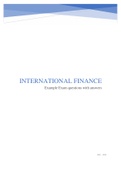Resume
Summary International Finance exam questions with answers
- Cours
- International Finance
- Établissement
- Vrije Universiteit Brussel (VUB)
This document contains some example exam questions with answers to know for the exam of the course International Finance. The document contains +- 40 questions.
[Montrer plus]



